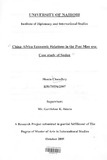| dc.description.abstract | The twenty first Century has seen a new era of closer ties between China and Africa than
ever before. China-Africa formal relations began when Zheng He visited African coastal
towns during the early fifteenth century. These early relations were largely based on trade
exchange, which with time developed into project assistance and training of guerrillas for
freedom movements against colonial regimes. During Mao's era (1949-76), China helped
African nations, by providing weapons and moral support, in their struggle for
independence. Following the wave of national independence throughout most of Africa,
China provided economic aid to many African countries.
After Mao's death in 1976, China's new government brought a total revolution in China's
foreign policy as the country focused more on modernization of its economy and did not
give much attention to foreign relations, especially with African countries.
From the early 1990s, China re-engaged with Africa but with a new strategy of win-win
relationship. Since early this century, China has been giving special emphasis to enhance
its trade exchange with African nations, by mainly importing oil and minerals from
Africa and exporting manufactured goods such as electronics, machinery and
equipments. Chinese government has been encouraging public and private enterprises to
invest in many African countries. According to a UN report, now China has also become
the main investor in Africa's infrastructure building.
China has also made a key contribution in the economic development of many resource
rich countries like Sudan, Nigeria and Angola. Likewise China has been investing heavily
in Sudan's oil industry and infrastructure building (like construction of dams, bridges,
roads, hydroelectric power stations, schools, hospitals etc.), textile industry, and
agriculture sector. With China's assistance, Sudan has become one of Africa's major oil
exporters, which has enabled Sudan to achieve remarkable economic growth in recent
years.
China's increased interest in Africa is attracting huge international attention and ongoing
debates. Following the forums of 2000 and 2003, in 2006, third Forum on China-Africa
Cooperation took place in Beijing, which was attended by 48 African delegations made
up of political leaders, businessmen and journalists. Through FOCAC, China reshaped its
foreign policy towards Africa, which is based on equality and mutual benefits. One of the
Forum's key objectives was to establish a new partnership for Africa's trade and
economic development. China also pledged to establish preferential trade and industrial
zones in Africa.
China has been giving bilateral aid in terms of grants, interest-free and unconditional
loans to many African Least Developed countries to boost their economies. China Exim
Bank and some other financial institutions are the sole providers of concessional
financing for Africa's development projects. This study examines China-Africa economic relations as well as China's new approach
and expanded relations with Africa in the post Mao era in many ways, including
enhanced economic and trade cooperation, cultural and educational exchange, medical
and public health, military exchange, and development assistance. | en |

